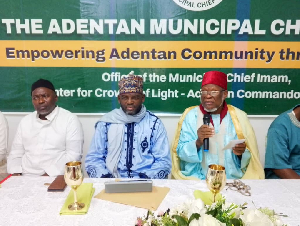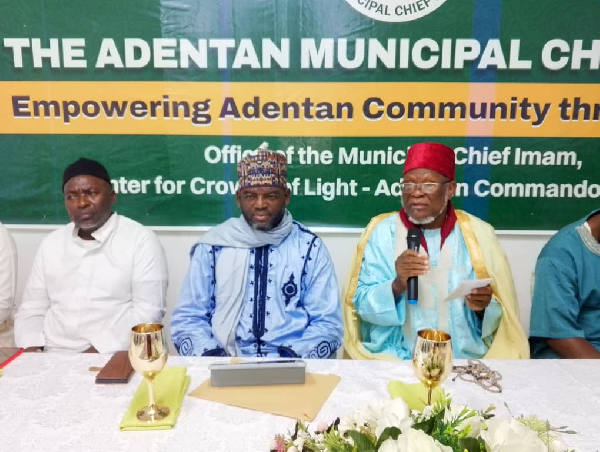 Sheikh Mutawakil Abubakar (second from left) with other imams
Sheikh Mutawakil Abubakar (second from left) with other imams
The Adentan Municipal Chief Imam, Sheikh Mutawakil Abubakar, has engaged imams and community members within the Adentan Municipality to empower them on the roles of imams in Islamic education.
He described Islamic education as a cornerstone of every Muslim’s responsibility.
The teeming youth were also taken through faith and proper ways of living in peace and harmony.
The event also brought together various imams within the Adentan Municipality to enable them have the needed knowledge to be able to disseminate what they have acquired through the orientation to their congregations, during sermons.
The gathering was also aimed at guiding the youth to continue the good practices they exhibited during the month of Ramadan.
The participants were taken through various topics that seek to guide their lives and strengthen their faith in living a better life after Ramadan.
Addressing the participants, Sheikh Mutawakil Abubakar stated that imam-ship is not merely to be a leader in prayer.
Rather, he said it is the heartbeat of the community.
The imams, he said, are the moral compass guide for both the young, the old, the guardian of knowledge and the torchbearers of enlightenment.
He revealed that the role of the imam in Islamic education is not a passive one, but rather, it is a divine duty an amanah (trust) from Allah adding that the first revelation sent to Prophet Muhammad (SAW) was a command “Read!” (Iqra’).
This divine instruction, according to him, highlights the essence of knowledge in Islam, therefore, the imams must be the custodians of Islamic learning, ensuring that the message of the Qur’an and Sunnah is not only preserved, but also imparted with wisdom and relevance at all times.
Speaking on imam as a guide for the youth, Sheikh Mutawakil Abubakar said that the youth are confronted with many temptations such as materialism, misinformation, moral decay, and identity crises, hence the need for the imams to rise to the occasion and serve as mentors, guiding the younger generation toward righteousness.
He added that the youth cannot be ignored to ideologies that distort the pure teachings of Islam.
“Are we teaching the Qur’an in a way that connects with our youth? Are we making Islamic education accessible, engaging, and relevant?
“If we fail in this duty, we allow ignorance to thrive, and when ignorance thrives, the Ummah suffers” he noted.
He stated that imams serve as a bridge between knowledge and action
and Islamic education is not merely about memorising verses or hadith.
On the role of imams and the responsibility of preserving the Islamic identity, he explained that many Muslims are struggling to hold on to their Islamic identity and the pull of secularism, Western philosophies, and un-Islamic cultural influences is strong and, therefore, called on imams to be the shield that protects the faith and identity of the Ummah.
He called for the establishment of strong Islamic institutions, madrasas, and community programs that teach not just religious doctrine, but also critical thinking, leadership, and ethics rooted in the Qur’an and Sunnah.
He emphasised the importance of unity within diversity and the need to teach the people that Islam is not just a religion; it is a complete way of life.


